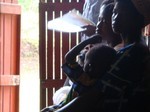'Even if the test result is negative, they should be able to tell us what is wrong with us'
11 September 2013

Patients in Ghana have high expectations about what malaria rapid diagnostic tests can achieve. A study funded by the ACT Consortium suggests that improving communication between health workers and patients could increase the number of patients demanding test-based diagnosis.
Researchers from the ACT Consortium conducted a qualitative study in Ghana to explore the experiences of patients and caregivers who had received a negative rapid diagnostic test (RDT) for malaria. Patients recognised the value of RDTs as part of a process to help doctors reach the right diagnosis and treatment, but they also thought that the test was able to identify any cause of illness, not just malaria.
The research team, led by Evelyn Ansah from the Ghana Health Service, compared the perceptions of patients who received and didn’t receive a malaria drug following a negative test result. The study was part of a randomized controlled trial in public health facilities where patients are normally treated for malaria based on their symptoms alone.
Statements from more than 50 people attending focus group discussions suggested that clinicians made little efforts to engage patients in the diagnosis and treatment process. The results of the study, now published in the Malaria Journal, suggest the need to clarify patients about what rapid diagnostic tests are – and their limitations.
One participant said: “Even if the test result is negative, the clinician should be able to tell us what is wrong with us or tell you that it is not malaria but rather this sickness, and prescribe drugs for us.”
In the long run, improving communication could help patients and caregivers better understand how to diagnose and treat fever. Ultimately, this could make them value RDT-based diagnosis, prevent them from seeking alternative forms of care and improve their acceptance to treatments.
The study also found that rapid diagnostic tests played an important role in communicating on behalf of the patient to the clinician, as patients were generally unable to explain their symptoms clearly. Many study participants were positive about the fact that RDTs took less time than microscopy – another diagnostic method that requires analysis at the laboratory.
The World Health Organization (WHO) recommends the use of rapid diagnostic tests (RDT) or microscopy to confirm the presence of malaria parasites in the blood of patients suspected to have malaria before prescribing treatment.
- Learn more about the study "How the use of rapid diagnostic tests influences clinicians’ decision to prescribe ACTs"
- Read the Malaria Journal article

